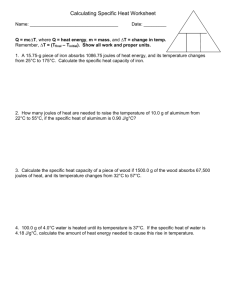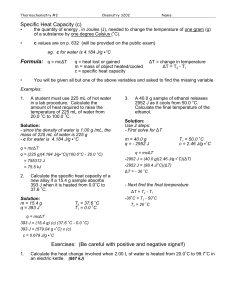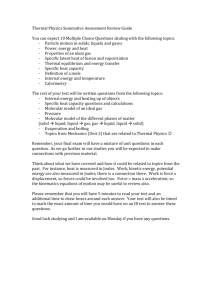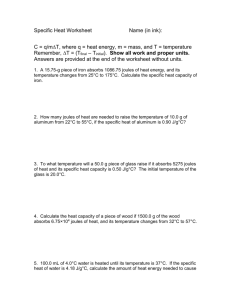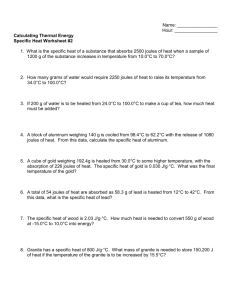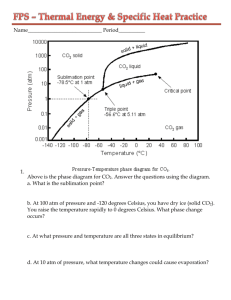Thermal Energy and Specific Heat Problems
advertisement
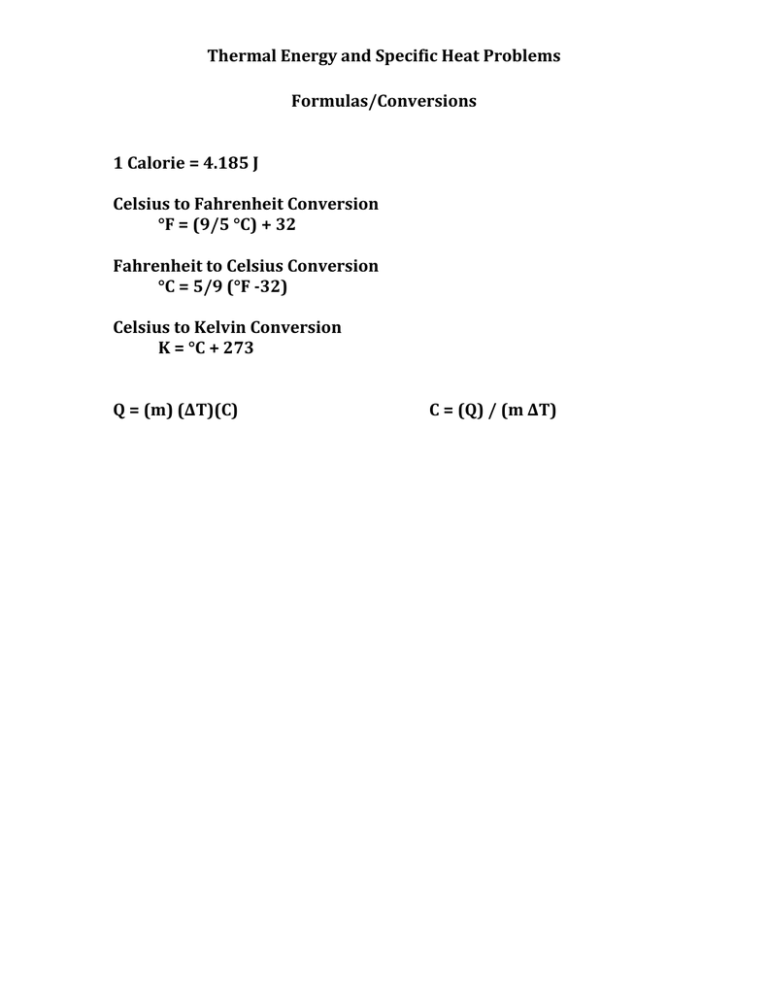
Thermal Energy and Specific Heat Problems Formulas/Conversions 1 Calorie = 4.185 J Celsius to Fahrenheit Conversion °F = (9/5 °C) + 32 Fahrenheit to Celsius Conversion °C = 5/9 (°F -32) Celsius to Kelvin Conversion K = °C + 273 Q = (m) (ΔT)(C) C = (Q) / (m ΔT) Thermal Energy and Specific Heat Problems 1. A 15.75-g piece of iron absorbs 1086.75 joules of heat energy, and its temperature changes from 25°C to 175°C. Calculate the specific heat capacity of iron in J/g°C. 2. How many joules of heat are needed to raise the temperature of 10.0 g of aluminum from 22°C to 55°C, if the specific heat of aluminum is 0.90 J/g°C? 3. To what temperature will a 50.0 g piece of glass raise if it absorbs 5275 joules of heat and its specific heat capacity is 0.50 J/g°C? The initial temperature of the glass is 20.0°C. 4. Calculate the specific heat capacity of a piece of wood if 1500.0 g of the wood absorbs 6.75×104 joules of heat, and its temperature changes from 32°C to 57°C. 5. 25.0 g of mercury is heated from 25°C to 155°C, and absorbs 455 joules of heat in the process. Calculate the specific heat capacity of mercury in J/g°C. 6. What is the specific heat capacity of silver metal if 55.00 g of the metal absorbs 47.3 calories of heat and the temperature rises 15.0°C? 7. Octane, a substance found in petroleum, boils at 126°C and is a liquid over a range of 183 Celsius degrees. What is the melting point of octane in kelvins? Thermal Energy and Specific Heat Problems 8. A 120g sample of an unknown substance was heated from 15oC to 30oC. The substance absorbed 458 joules of energy. What is the specific heat of this substance? 9. A 2.0-kg slab of concrete requires 11 kJ to raise its temperature from 23°C to 29°C. What is the specific heat of concrete in J/g°C? 10. If the temperature of 28 g of ethanol increases from 15oC to 65.5 oC, how much heat was absorbed by the ethanol? (Specific heat ethanol = 2.44 J/goC) Convert the following temperatures to both °F and Kelvin 11. -257.87 °C °F K 12. -40.0 °C °F K 13. 1064°C °F K 14. How much energy is needed to increase the temperature of 755 g of iron from 283 K to 403 K (CIron = 0.46 J/g°C)? 15. If the specific heat of water is 4.185 J/g°C , how much energy must a refrigerator absorb from 225 g of water to freeze the water if the initial temperature is 35 °C? 16. What mass of water is required to absorb 4.7 x 105 J of energy from a car engine when the temperature increases 57 °C? 17. A vanadium bolt gives up 1124 J of energy as its temperature drops 25 K. If the bolt’s mass is 0.093 kg, what is the specific heat J/g°C? 18. Determine the change in energy if 550 g of copper (C = 0.39 J/g°C) is heated from 318 K to 24 °C. 19. The temperature of deep space is thought to be around 3 K. What is this temperature in °F? Thermal Energy and Specific Heat Problems 20. Determine the amount of energy needed to raise the temperature of a silver necklace (specific heat = 0.23 J/g°C) with a mass of 22.5 g from 77 °F to 37 °C.
